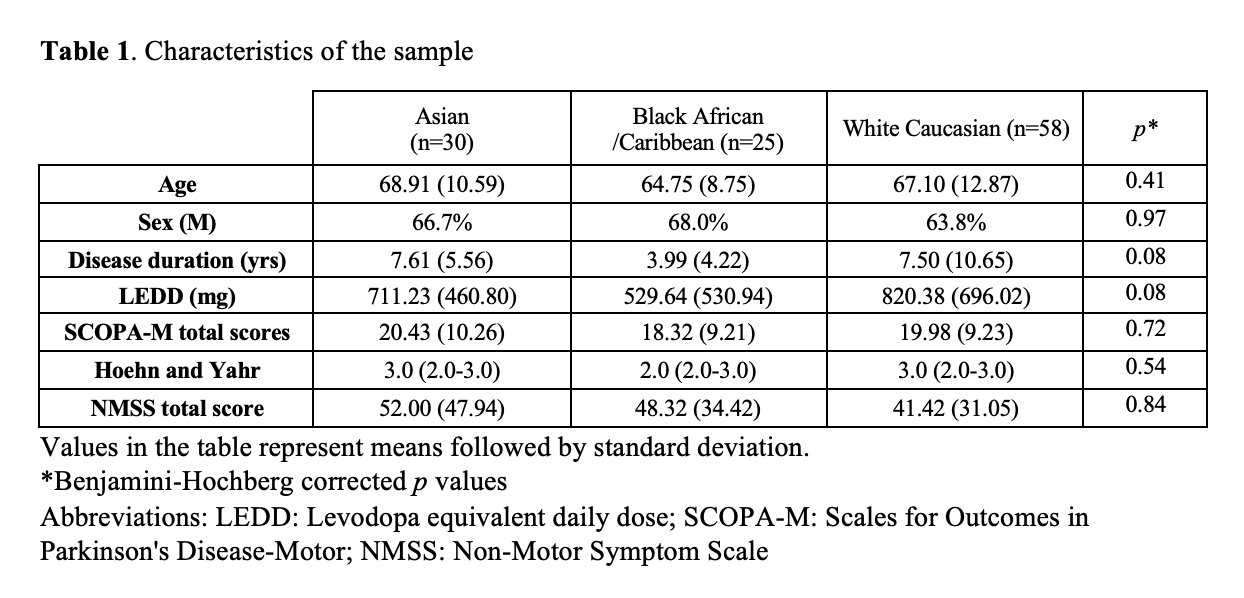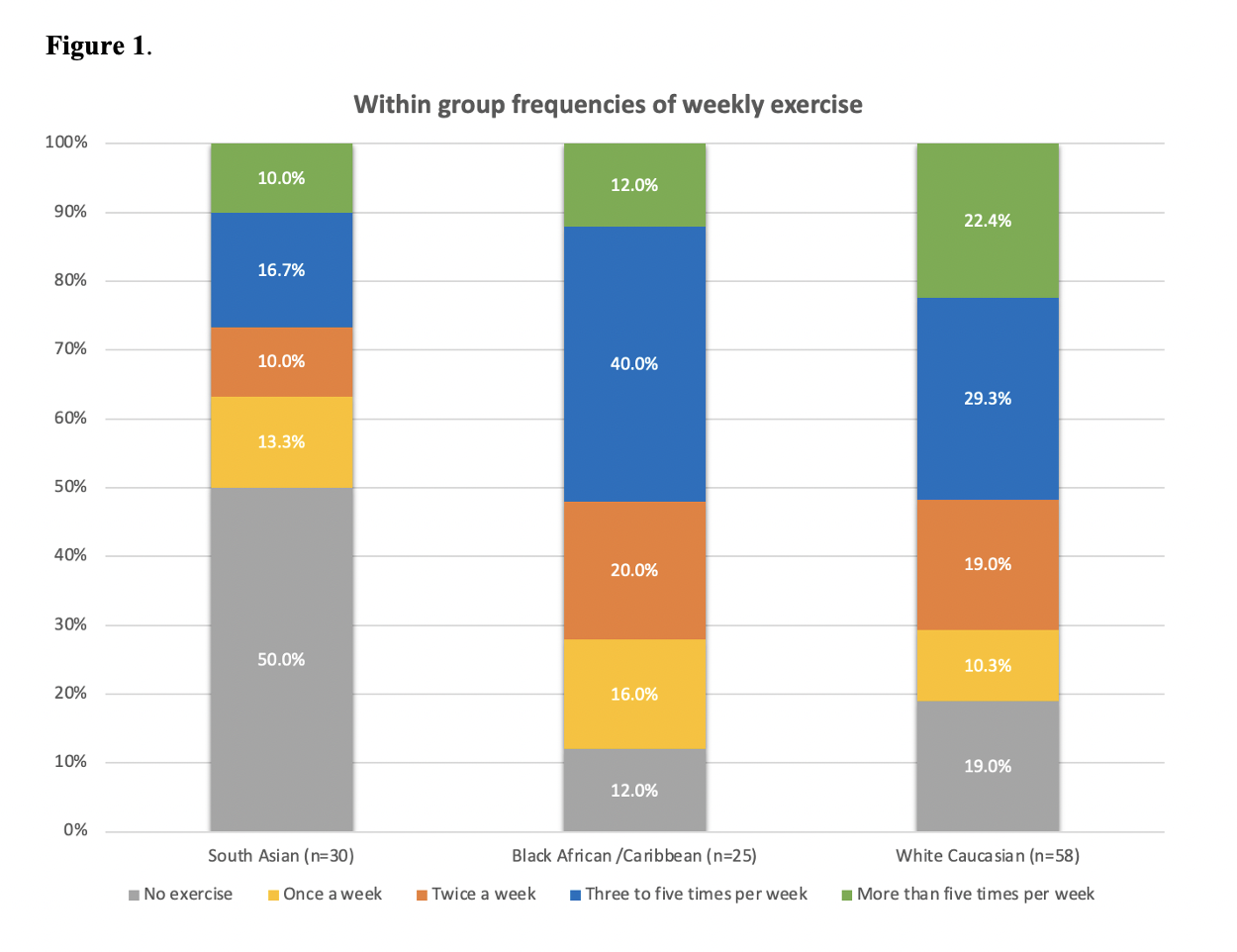Objective: To investigate exercise habits across different ethnicities of People with Parkinson’s.
Background: There is evidence that exercise is beneficial for People with Parkinson’s (PwP) [1]. Numerous studies report on the effectiveness of different types of exercise including aerobic training, yoga, dance and tai chi on both motor and non-motor symptoms [2–5]. It is also evident that PwP are unlikely to adhere to an exercise regime they do not find enjoyable [2]. However, little is known about exercise habits across different ethnicities.
Method: Participants enrolled in the Parkinson’s and Ethnicity study (REC Number: 14/LO/2117, UKCRN: 18278, ethnicity assigned per guidelines of the Office for National Statistics) with a confirmed PD diagnosis and data on physical activity where available, were included in the analysis. The type of exercise and the frequency (number of days per week with at least 30 minutes of moderate physical activity) were reported.
Results: A total of 113 PwP were included in this study: 58 were White Caucasian (WC), 30 were South Asian (SA), and 25 were Black African/Caribbean (BAC). The three ethnic groups were matched for age, sex, disease duration, levodopa equivalent daily dose, Hoehn and Yahr stage and motor function (Scales for Outcomes in Parkinson’s Disease-Motor) (Table 1). Eighty eight percent of BAC, 81% of WC and 50% of SA participants reported exercising once or more per week (Table 2 and Figure 1). Among WC participants, walking was reported to be most prevalent (69.0%), followed by relaxation techniques (15.0%) and tai chi (10.3%). SA participants also reported walking to be most prevalent (56.7%), followed by aerobics (6.7%), cycling (6.7%) and yoga (6.7%). Lastly, BAC participants reported walking to be most prevalent (72.0%), followed by dance (20.0%), relaxation techniques (12.0%) and cycling (12.0%).
Conclusion: There are differences in exercise habits of PwP across different ethnicities, with the lowest prevalence of exercisers being among South Asian PwP. Further research is necessary to explore the findings in granular details in larger collaborations, but this data may help customise approaches to increase compliance for exercise in these different ethnic groups.
References: 1. Mak MK, Wong-Yu IS, Shen X, Chung CL. Long-term effects of exercise and physical therapy in people with Parkinson disease. Nat Rev Neurol. 2017 Nov;13(11):689-703. doi: 10.1038/nrneurol.2017.128. Epub 2017 Oct 13. PMID: 29027544. 2. van der Kolk NM, de Vries NM, Kessels RPC, Joosten H, Zwinderman AH, Post B, Bloem BR. Effectiveness of home-based and remotely supervised aerobic exercise in Parkinson’s disease: a double-blind, randomised controlled trial. Lancet Neurol. 2019 Nov;18(11):998-1008. doi: 10.1016/S1474-4422(19)30285-6. Epub 2019 Sep 11. PMID: 31521532. 3. Kwok JYY, Kwan JCY, Auyeung M, Mok VCT, Lau CKY, Choi KC, Chan HYL. Effects of Mindfulness Yoga vs Stretching and Resistance Training Exercises on Anxiety and Depression for People With Parkinson Disease: A Randomized Clinical Trial. JAMA Neurol. 2019 Jul 1;76(7):755-763. doi: 10.1001/jamaneurol.2019.0534. PMID: 30958514; PMCID: PMC6583059. 4. Dos Santos Delabary M, Komeroski IG, Monteiro EP, Costa RR, Haas AN. Effects of dance practice on functional mobility, motor symptoms and quality of life in people with Parkinson’s disease: a systematic review with meta-analysis. Aging Clin Exp Res. 2018 Jul;30(7):727-735. doi: 10.1007/s40520-017-0836-2. Epub 2017 Oct 4. PMID: 28980176. 5. Song R, Grabowska W, Park M, Osypiuk K, Vergara-Diaz GP, Bonato P, Hausdorff JM, Fox M, Sudarsky LR, Macklin E, Wayne PM. The impact of Tai Chi and Qigong mind-body exercises on motor and non-motor function and quality of life in Parkinson’s disease: A systematic review and meta-analysis. Parkinsonism Relat Disord. 2017 Aug;41:3-13. doi: 10.1016/j.parkreldis.2017.05.019. Epub 2017 May 25. PMID: 28602515; PMCID: PMC5618798.
To cite this abstract in AMA style:
A. Podlewska, A. Sauerbier, D. van Wamelen, L. Batzu, V. Leta, I. Subramanian, K. Ray Chaudhuri. Exercise habits of People with Parkinson’s across different ethnic populations [abstract]. Mov Disord. 2021; 36 (suppl 1). https://www.mdsabstracts.org/abstract/exercise-habits-of-people-with-parkinsons-across-different-ethnic-populations/. Accessed January 7, 2026.« Back to MDS Virtual Congress 2021
MDS Abstracts - https://www.mdsabstracts.org/abstract/exercise-habits-of-people-with-parkinsons-across-different-ethnic-populations/



